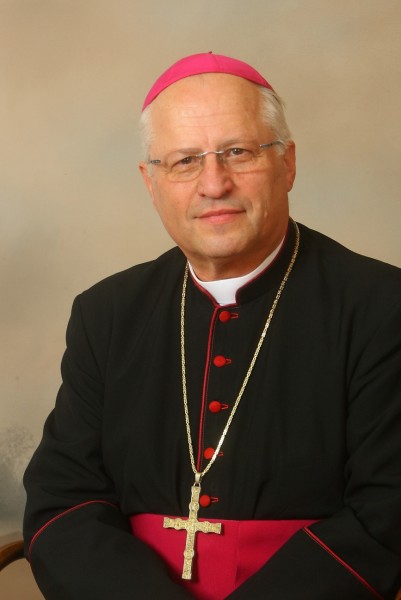Introduction
On behalf of the Slovene Bishops’ Conference and in my name, I greet all the attending brothers in episcopacy (archbishops and bishops), all priests and friars as well as you, dear brothers and sisters, who still feel there is a Slovene heart beating inside you. I especially greet the local bishop His Excellency Mons. Alexander Sample–11th successor of Bishop Baraga–and all the believers from the Diocese of Marquette.
This year’s Baraga Days are even more solemn and festive, since on May 10 this year, Pope Benedict XVI signed the decree of the heroic virtues of the first bishop of Marquette, Bishop F. I. Baraga, which now allows us to call him and commend ourselves to him as a reverend servant of God with even greater trust. This year also marks the 60th anniversary of the beginning of the beatification process as well as the 40th anniversary of the submission of the “positio”.
First, let us repent our sins, so that we may be worthy of celebrating the Holy Eucharist.
Homily
Dear brothers and sisters!
I come from the 6 years ago newly established Diocese of Novo mesto, which comprises the Parish of Dobrnič with the village of Mala vas, the birthplace of our Bishop Frederic Irenej Baraga. Having been my father’s home parish, the parish of Dobrnič is also where I stem from myself. Our diocese is relatively small, comprising only 140,000 Catholics. It covers the part of Slovenia where, by the goodness of God, many candidate saints come from. In the last 2 years, three martyrs have been proclaimed blessed: 1 man, a 19-year-old laic, graduate Alojzij Grozde, victim of the Communist terror and revolution at the start of World War II, and 2 women, nuns, s. Krizina Bojanc and s. Antonija Fabijan, innocent victims of Serbian nationalism in Bosnia, also at the start of World War II. Apart from these three, another reverend servant of God comes from the Diocese of Novo mesto, namely Bishop Janez F. Gnidovec, who died as Bishop of Skopje, Macedonia, and whose heroic virtues the Pope has already approved. We are now waiting for approval of the miracle attributed to him. As of last year, a process has also been underway for Missionary Andrej Majcen, also called Chinese and South-Vietnamese Don Bosco. And last but not least, I must not fail to mention that the ground of our diocese was also sprinkled by the blood of thousands of innocently murdered victims of Communism during, but mostly after World War II.
Dear brothers and sisters!
Following the decision of the Holy Father Benedict XVI, the Year of Faith will be starting next month. Reverend servant of God, Frederic Baraga, can be called a man of faith–an example of heroic faith. Already in 1869, only one year after Baraga’s death, the editor of the Slovene religious newspaper Zgodnja Danica invited the Slovene youth to choose Baraga as their model of faith.
Six years after Baraga’s death, A. Kuhls wrote an article in the Baltimore newspaper Volkszeitung entitled ”Holy Bishop”. Among other things, it says: “In his life already, he was generally revered as a saint, and there are manifold wonders that his love had bestowed upon the Indians, his children.” In 1902 already, his beatification process was being announcing and he himself classed among the six American candidate saints, of whom at least the Philadelphian Bishop John Neumann, who had been inspired to go into missions by Baraga’s writings, and Elizabeth Ann Seton have already been proclaimed saints.
It was still during his law studies alongside the Apostle of Vienna, St. Clement Hofbauer, that Baraga had deepened his faith. This faith was so strong and steadfast that people coming into contact with him felt that they were seeing the realities of God before them. As a practical man and a dedicated missionary, he was always amid the world, yet his look, his mind and his conduct indicated that he was not of this world. When reading his books, we need to consider that they were written by a man of faith.
With Baraga, the reality of living God, the mystery of the incarnation of the Son of God, the necessity of mercy, the fact of eternal life and the responsibility for life, as well as faith in sacraments, above all Baptism and Eucharist were all tangible realities. In his first pastoral letter in English from 1853, he wrote: “Our first essential duty towards God is the duty of Faith, which consists in the believing of every word that God has revealed to us, without rejecting a single point of revealed faith. Some truths of our religion are so sublime that we cannot comprehend them with our feeble and limited reason. These truths we also must believe on the authority of God who never can err, never deceive nor be deceived.” (Baraga’s PL, p. 2)
In many letters, he was complaining about how much practical and theoretical atheism he was coming across. In 1833, he wrote to Vienna: “A big part of the population of the United States is not baptized, has no faith whatsoever.” That same year, German missionary Sändel came to a similar conclusion, saying that many whites born in America do not belong to any religion. Baraga’s first successor in episcopacy, Ignacij Mrak, too, in 1857, observed ignorance and unbelief. In his letter, he gives a brief account of his meeting a worker at a sawmill, whom he asked if he was Catholic, and the latter replied: “I have no faith. I think the best faith is to live honestly” and then continues: “There are many people like him, with no faith, over here…”
In his first pastoral letter, Baraga was teaching: “This duty of faith is essential and the fulfilling of it necessary for salvation, because without faith it is impossible to please God (cf. Heb 11:6) … we must live by our faith according to the principles of our holy religion; we must make it our rule of life.” (PL) Faith must guide the steps of our life.
Whenever Baraga speaks of faith, he thinks first and foremost of believing in the living personal God and only then, in connection with that, of religious truths.
In this first bishop’s message, Baraga explains how we must love God with all our heart, all our soul, all our mind and all our strength. In conclusion, he writes: “Especially endeavour to have the true love of God, which is the very foundation of all Christianity, and the glorious mark of a happy predestination. If you love God sincerely and above all, you will easily fulfil all other duties towards Him. Nothing is difficult, nothing tedious, to a loving heart.” (PL, p. 12) To such undivided love, he was calling all people without exception, but most of all, he was demonstrating it himself, day after day.
Baraga’s concern for evangelization and comprehensive lives of believers is reflected particularly in his motto “Only one thing is necessary”. He found that the authorities were trying in different ways to help pagans cure themselves of various passions and vices, but to very little avail. “Only our holy religion of God is capable of making pagans good people. Only the ones who had decided to accept our holy religion change their whole life,” he was reasoning at the outset of his missionary career.
Today, we are speaking of the new evangelization. The Bishops’ Synod will be dedicated to it as well. The essence of this new evangelization is that it needs to be new in its ardour, its methods and its expression. An evangelist more ardent than Baraga is difficult to imagine. Back home in Slovenia and later on in his missions, he was trying to evangelize using new methods and a new expression as well–to shape well-rounded believers rooted fully and firmly in God, while truly living a life worthy of man.
From Baraga’s life, his evangelization and his records as well as from the instructions for the Year of Faith, we can infer that in the Year of Faith, we must above all cling to the following: a more thorough religious education (Catechism), praying (personal faith), receiving sacraments, especially the Eucharist, and venerating the Mother of God.
Reverend servant of God Frederic Irenej Baraga, call down on us, in this Year of Faith, a real deepening of faith in your diocese of Marquette, in our Slovene dioceses and among all the Slovene around the world.
Amen!
Msgr. Andrej Glavan
Bishop of Novo mesto


